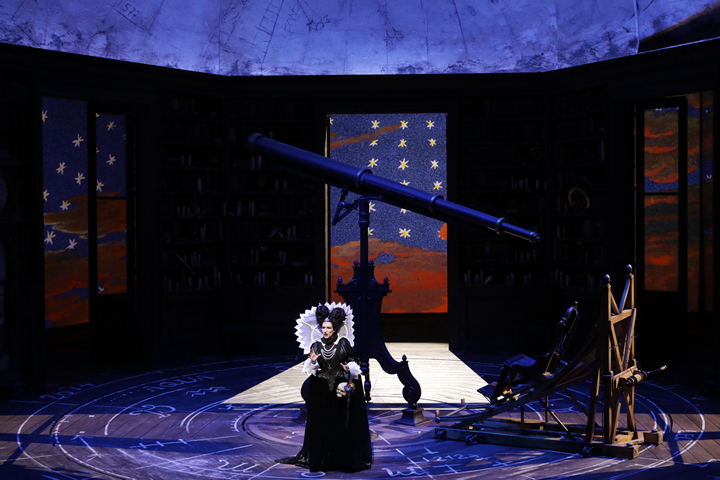| Opera Reviews | 26 April 2024 |
David McVicar's compelling production of La Calisto brings baroque to La Scalaby Silvia Luraghi |
|
Cavalli: La Calisto |
|

|
|
|
Exactly 370 years after its 1651 Venice world premiere, Francesco Cavalli’s opera La Calisto made it to the stage of La Scala. That baroque opera is not among the standard repertoire of the Milanese company is well known, but in recent years artistic directors have been trying to fill this gap with various and mostly successful productions. And La Calisto was certainly a success, on account of an excellent vocal cast and especially due to David McVicar’s fabulous production. The libretto by Giovanni Faustini, based on Ovid’s Metamorphoses, is about the transformation in the Ursa Major constellation of nymph Calisto, seduced by Jove. The director, assisted by set designer Charles Edwards and costume designer Doey Lüthi, chose a 17th century setting for the opera, starting with the prologue. This was an era of great astronomical discoveries: accordingly, the curtain unveils an astronomical lab, with a gigantic telescope and the three deities discussing the future of Calisto are three astronomers in 17th century costumes. In the first act, Jove descends from heaven dressed as Louis XIV of France, and the nymphs wear costumes typical of pastoral intermezzi. Jove seduces Calisto disguised as Diana, as recommended by Mercury. The plot becomes more complicated when the real Diana enters the scene and shuns Calisto’s affectionate attempts to kiss her. Diana herself is in love with Endymion which causes the jealousy of Pan, who, with a group of satyrs, captures and tortures him. Juno discovers the betrayal of Jove and turns Calisto into a bear. In the final act, Endymion agrees on sleeping forever after having been kissed by Diana, and Calisto realizes that her soul belongs to the Empyrean, where she will return under the form of a constellation of stars. The strong cast featured soprano Chen Reiss in the title role, endowed with a luminous and sensual voice and an easy top. Luca Tittolo was an authoritarian, albeit rather ineffectual Jove, with a dark and warm timbre. Mezzo Olga Bezsmertna was compelling both when interpreting the real Diana and when interpreting Jove in disguise with a perfectly tuned voice that flawlessly encompassed the whole range, while soprano Véronique Gens portrayed Juno as a disenchanted but not resigned spouse, exhibiting a firm and well sustained emission. Markus Werba lent his handsomely colored baritone to Mercuy. Countertenor Christophe Dumaux was a melancholic Endymion, the opposite of Chiara Amarù, a delightful nymph Linfea, who arises the desire of Satirino (the equally compelling soprano Damiana Mizzi) with her confession that she would like to find a lover. Under the baton of Maestro Christophe Rousset, the orchestra of La Scala played on original instruments joined by Les Talens Lyriques. All performers were met with enthusiasm by the audience who were finally allowed to fill all the seats in the theater.
|
|
| Text ©
Silvia Luraghi Photo Brescia e Amisano © Teatro alla Scala |
|







